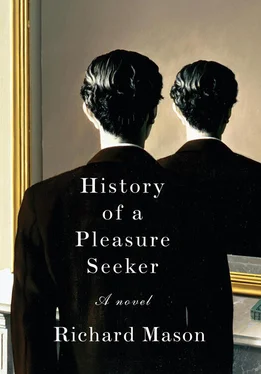She went to her room directly after dinner. It was the largest of the servants’ bedrooms, but it had no windows, having once been a coal cellar, and she longed for starlight and fresh breezes. As soon as she heard Hilde close her door, she changed into slippers and went out into the corridor. The house was dark but she knew every inch of it. At the foot of the servants’ stairs she stopped and listened. No one was abroad. She went up them and into the dining room. From a cabinet with a smooth-swinging door she took a liqueur glass and exchanged it, after a moment’s hesitation, for a larger vessel. She filled this to the brim from the first decanter on the drinks tray, pinched her nose, and drank it all down.
It was port wine — very sweet, and it made her splutter. She was not an experienced drinker. She put the glass on the sideboard, where Hilde would think she had missed it when laying for breakfast, and went down the passage to the octagonal parlor. In her precisely ordered brain were stored the needs of every piece she passed — which chairs were to be waxed twice a year, which never; which tapestries must be moved in the summer months. These details mattered much more to her than the objects’ provenance or value. Her allegiance to each was total.
The octagonal room was draped in a light like silver organza. She closed the door, opened the French windows to the garden, and sat on the gilt sofa that had been made for the palace of St. Cloud. It upset her to think of all this beautiful furniture being sold to people with indifferent housekeepers.
The air was cold and stimulating. She brought her hands together but did not pray. Naomi de Leeuw had long since stopped bothering herself with God. In the mystical half-light Maarten Vermeulen came to her, bounding and energetic as he had been on the day of their first meeting, thirty-one years before.
He had just bought a share in the Amstel Hotel. She was a senior chambermaid, barred from advancement by a jealous superior. Maarten had recognized her talent and made her housekeeper of the mansion he had purchased on the Herengracht. He was unsophisticated in those days, still acquiring possessions and polish. It was she who had trained the servants and arranged the flowers and furniture. How she had helped him! Jacobina Sickerts would never have married him had she not spent three years teaching him to take deference for granted.
She looked up at the chandelier of gilded griffins above her: one of a pair bought by Maarten in the days of his bachelorhood for the salon on the first floor. In that time the drawing room had been a masculine, Gothic preserve. Miss Sickerts had objected to its gloom and Maarten had redecorated and banished its fittings as soon as they were engaged. One griffin chandelier had been relegated here; the other had been given to her — an impetuous, thoughtless gift that caused her much anguish.
Naomi de Leeuw had not known her father and was well into her teens before she understood that the strange men she passed on the stairs helped her mother pay the bills. It was her sister Annetjie, thirteen years older, who was her protectress, the fount of all affection and knowledge, a warm, sweet body to cling to at night when snow fell through the broken tiles of the roof.
When Annetjie met Gerhardt Moritz, she was twenty-four and Naomi eleven. Naomi never imagined her handsome brother-in-law might steal her sister away; it had never occurred to her that anyone could. But a year later, Mr. Moritz announced the couple’s departure for the Orange Free State, where there were farms aplenty and no white woman need do her own washing. Only then did she grasp the reality of his theft.
Gerhardt took Annetjie away one week after Naomi’s twelfth birthday, and on that day Naomi made a vow: that she would earn the money to visit her sister at the outer reaches of the world. She went into service at fourteen, and though the fantasy remained ungraspable she did not abandon it; held it, instead, as a talisman against the wretchedness of cleaning other people’s floors.
The Vermeulen-Sickerts’ gift of the griffin chandelier had seemed miraculous — because Naomi knew what her employer had paid for it, and this was more than sufficient for a passage to South Africa.
Throughout the wet winter of 1879 she had done her best to sell it; had spent her savings on the carriages required to transport it to dealers who took one look at her clothes and offered a fraction of its value; or accused her of theft. She obtained from Maarten a letter certifying her ownership, but this made the dealers less skeptical, not more generous. She began to wish that Maarten had sold it himself and given her the money, but she was too proud to ask this favor.
It was at this period that Naomi, without ever saying so aloud, jettisoned her faith in God. She continued to set an excellent example of church attendance to the lower servants but never again believed the assurances she heard that God would not abandon His children or test them more severely than they could withstand.
Three decades later, she unclasped her hands, and the anger of the evening flowed through her fingers and cooled. It left behind a polished pebble of truth: that the Vermeulen-Sickertses were not wicked. They simply did not care to imagine what life was like for other people.
It had taken the squandering of half Naomi’s savings to suffocate her long-nourished dream. With the last of her money she sent the chandelier as a wedding gift to Annetjie’s daughter, Gertruida, who was marrying a man named van Vuuren. For years, until middle age deadened such fancies, she imagined a link between the winged lions in Amsterdam and their siblings in Bloemfontein and polished their dragonscale shades herself, talking as she did so to her sister as though they were sitting side by side.
Annetjie had been dead for fifteen years, but the griffins observed her with an encouraging sternness that reminded Naomi of her sister when she wished to scold her. She rose and stood very straight. “As long as I can walk and speak,” she said to the moon-drenched garden, “I will make my own luck.”
And she went to bed and behaved the next day as though her outburst had never taken place.
In answer to Maarten’s plea, the banking system of the United States began an abrupt and emphatic recovery. On October 23rd, while he lay in despair in his cabin on the Lusitania , J. P. Morgan succeeded in persuading New York’s leading financiers to provide loans of $8.25 million to prevent a second trust company from following the Knickerbocker into oblivion. The next day, Thursday 24th, Secretary Cortelyou of the Treasury deposited $25 million of government money in the New York banks and J. D. Rockefeller pledged half his fortune to maintain America’s credit. The New York Stock Exchange almost suspended trading that day and the next, and the markets only made it to Friday’s closing bell thanks to Morgan’s raising of $33.3 million in forty-eight hours.
When Maarten later pieced together these events and compared them with the trajectory of his own drama, he was not surprised to discover that none of these measures had worked. None of them could have done while God remained intent on punishing him. Only over the weekend of October 26th and 27th, when through fasting he had begun to see clearly, did the panic ebb. And only on Monday 28th, after Maarten had confessed to his family and begun the grueling admission of his downfall to his friends (one of whom would play Iscariot) was $100 million in loan certificates issued by the New York Clearing House.
In the absence of a central bank these loan certificates functioned as de facto currency. With each confession Maarten made, more banks agreed to accept them in settlement of loans and advances. This enabled other institutions to retain reserves of real greenbacks to honor the demands of frightened depositors. By Tuesday 29th, when Maarten, having abandoned all pride, threw himself wholly on his Creator’s mercy, proof of God’s steadfast love was provided by the restoration of calm in New York.
Читать дальше












